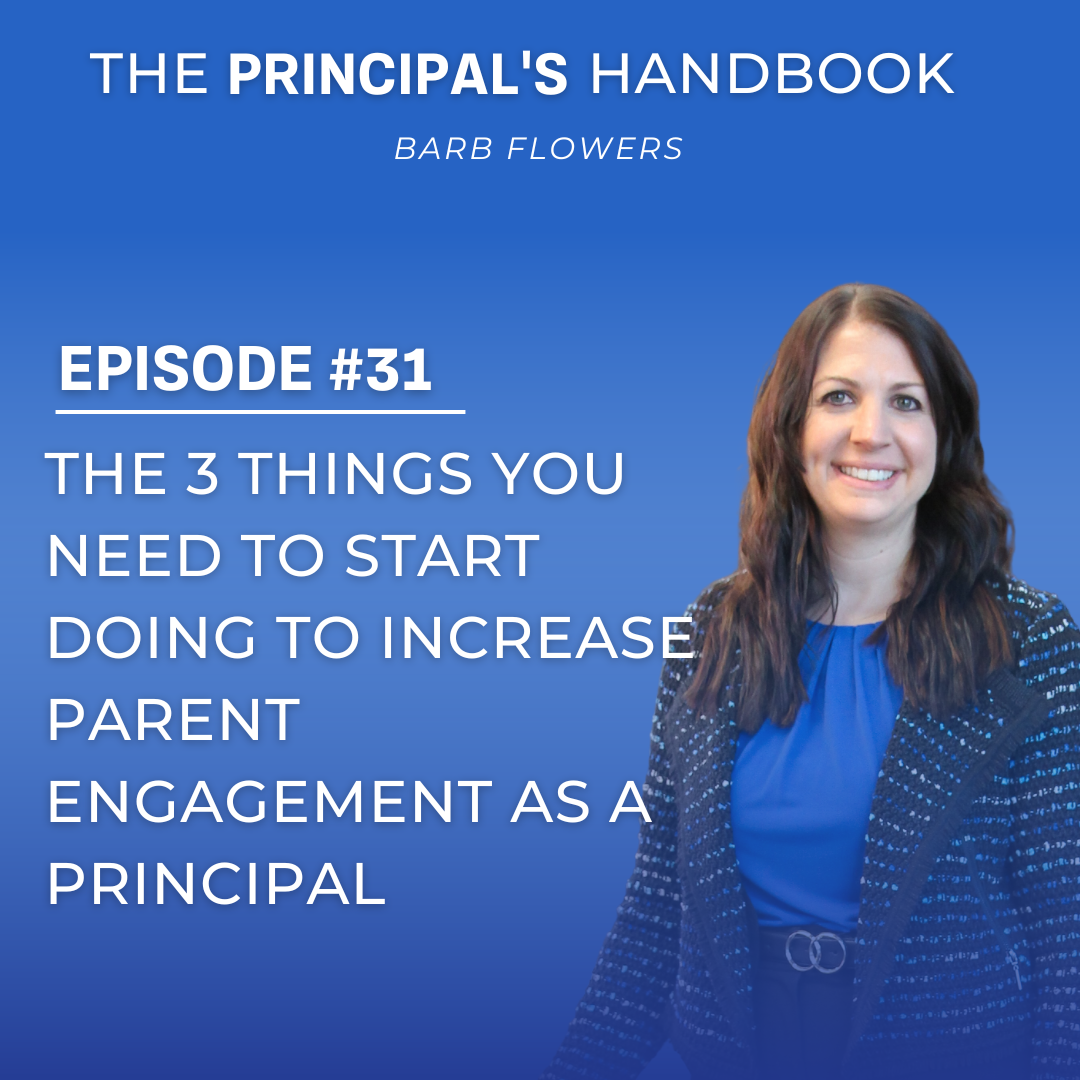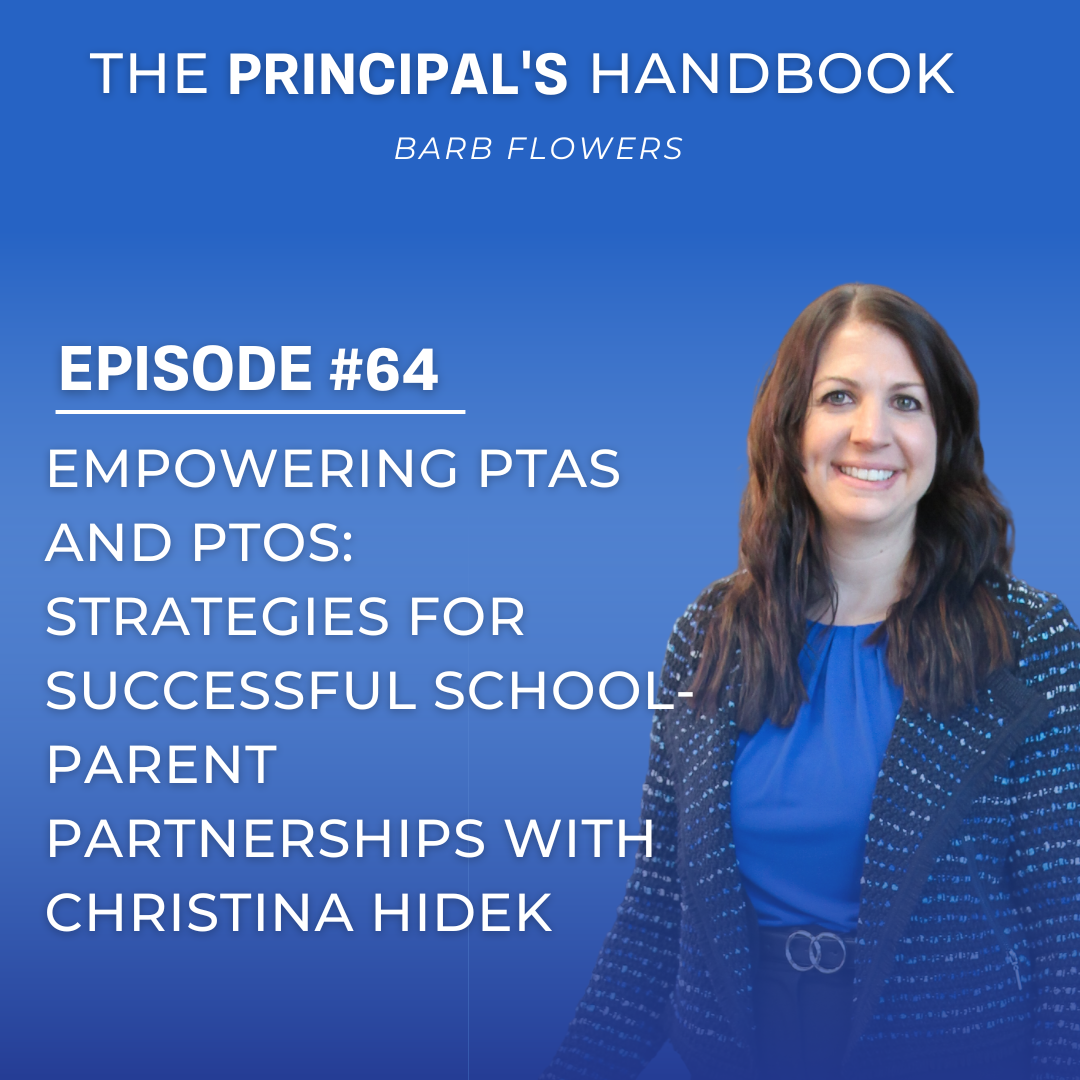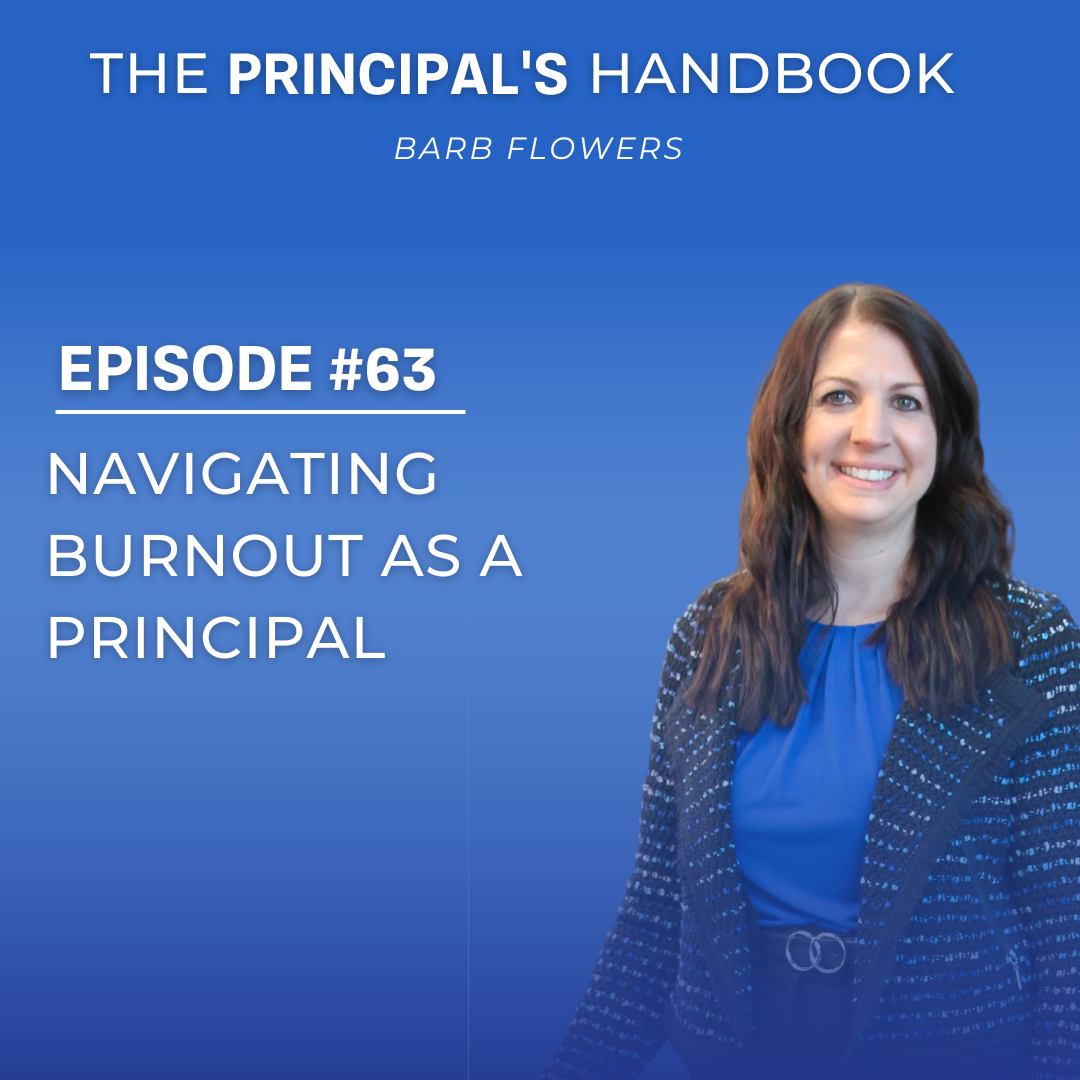In today’s episode, I’ll share the three essential things you need to start doing to increase parent engagement. Stay tuned, because that’s all coming up next, right here on The Principal’s Handbook.
[00:01:00]
Welcome to The Principal’s Handbook, your go-to resource for principals looking to revamp their leadership approach and prioritize self-care. I’m Barb Flowers, a certified life coach with eight years of experience as an elementary principal. Each week, we dive into strategies for boosting mental resilience, managing time effectively, and nurturing overall wellness. From tackling daily challenges to maintaining a healthy work-life balance, I’m here to help you navigate the complexities of school leadership. Welcome to a podcast where your well-being is the top priority.
[00:01:30]
Welcome back to the podcast! Today, we’re diving into the three things you need to start doing to increase parent engagement. But before we get started, let’s first talk about what true parent engagement really is.
There’s a difference between parent involvement and parent engagement. According to the DASH report from the CDC, parent engagement is when parents and school staff work together to support and improve the learning, development, and health of children and adolescents. Involvement, on the other hand, might look like parents attending conferences or school events. Both are essential, but we need to ensure that we’re not just inviting parents to events; we need to actively engage them in the learning process.
When parents and families aren’t involved, educators sometimes fall into the trap of assuming they don’t care. But we know this isn’t true. Parents may face barriers like transportation issues, work schedules, or negative past experiences with schools. We have to understand that and approach every family with empathy. Each family brings a different experience and perspective, and we must be mindful of that.
Research, including the DASH report, shows that parent engagement is closely linked to better student behavior, higher academic achievement, and enhanced social skills. We’ve known this for years, but as we get caught up in the busyness of our roles, we sometimes lose sight of how crucial parent engagement is for student success.
[00:03:00]
I’ll admit, as a teacher, I was often afraid to call parents. I worried that I’d be bothering them, or that they didn’t want to hear from me if they hadn’t reached out first. Reflecting on it now, I realize I didn’t always make the time to truly engage with parents, and I was missing an important opportunity. It’s easy to get overwhelmed in the day-to-day, but we must remember that parent engagement is key to helping our students thrive.
So today, I’m going to share the three things you can start doing today to increase parent engagement.
[00:04:00]
Number 1: Invest in professional development for teachers on building parent relationships.
Not all teachers are naturally good at building relationships with adults. Some teachers are fantastic with students but may feel awkward or uncomfortable engaging with parents. This is okay, but as leaders, we need to support these teachers with professional development that teaches them how to communicate and build rapport with parents. It’s crucial that we give them the skills and confidence to connect with families.
For other teachers, who may already be good at working with parents, we still need to offer coaching to reinforce those skills. As principals, it’s our job to lead professional development that teaches empathy, active listening, and positive communication. Parents want to be heard, and if we only talk at them without listening, we risk disengaging them completely.
We also need to address teacher biases. As educators, we all have biases based on our own experiences. It’s important to have conversations with staff about these biases and how they might affect their relationships with parents. For example, if a teacher grew up in a two-parent household with a set routine, it might be harder for them to relate to a single parent with a hectic schedule. Understanding these perspectives can improve parent-teacher relationships and increase engagement.
Finally, coaching teachers through difficult conversations with parents is essential. Teachers may struggle with tough conversations or feel uncomfortable when parents reach out with concerns. Offering coaching on how to respond calmly and professionally, especially when emotions are involved, can make a big difference.
[00:08:00]
Number 2: Create diverse opportunities for parents to be involved and engaged in the school.
Parents have different schedules, so we need to offer multiple opportunities for them to engage with the school. Don’t just assume that evening events are the best option. Some parents work night shifts or have unpredictable schedules, so offering daytime options can make it easier for them to participate. You can also conduct surveys to ask parents when and how they’d prefer to get involved.
Encourage students to invite their parents by having them create invitations for events. For example, you could host an “Author’s Tea” where students share their work with their parents, or you could organize a “Wax Museum” showcasing student projects. These events create a sense of ownership for the students while also fostering parent involvement.
You can also promote events that help parents understand what their children are learning and how they can support them at home. Title I nights, curriculum nights, and math nights are great ways to help parents understand what’s happening in the classroom and how they can assist their children. These types of events show parents that they are an integral part of the educational process.
[00:10:00]
Number 3: Provide courses, resources, and training for parents.
Modern parenting is different, and as educators, we need to acknowledge the challenges parents face today. From rapid changes in technology to the pressures of balancing work and family life, we can’t assume that parents know how to support their children in every area. We need to offer resources and support to help them navigate these challenges.
For example, social media and technology issues are becoming more prevalent at younger ages. In my own experience, I’ve had to talk with parents about issues their children were facing online. Offering resources like workshops or informational nights about social media, mental health, or how to handle technology can equip parents with the tools they need to support their children.
Additionally, we need to recognize the unique challenges faced by families, such as co-parenting or single-parent households. Offering resources to help these families manage their situations can create a more supportive school environment. A resource hub, whether physical or digital, where parents can access information on topics like mental health, divorce, or parenting strategies can make a big difference.
[00:13:00]
Providing these resources and courses shows parents that we are committed to supporting them—not just their children. By equipping them with knowledge, we help them become more confident in their parenting and more engaged in their children’s education.
[00:15:00]
To recap:
-
Invest in professional development for teachers on building parent relationships.
-
Create diverse opportunities for parents to be involved and engaged in the school community.
-
Provide courses, resources, and training for parents.
By implementing these strategies, schools can create a welcoming and supportive environment that encourages family involvement, ultimately benefiting student growth and learning.
If you’re a principal looking to elevate your leadership and well-being, I’m here to help. My one-on-one coaching offers clarity, resilience, and practical tools to improve your effectiveness as a leader. Reach out to me for a complimentary session to discuss your current challenges and future aspirations.
Visit me on Instagram at @barbflowerscoaching or go to barbflowerscoaching.com. If you love the show, please leave a review on Apple Podcasts. Remember, you have the power to shape your life based on the mindset you choose.
I hope you have a great week, and I’ll see you back here next time.






